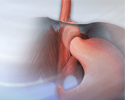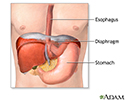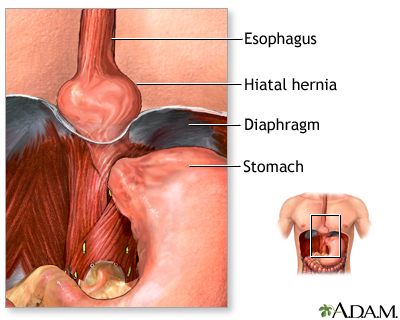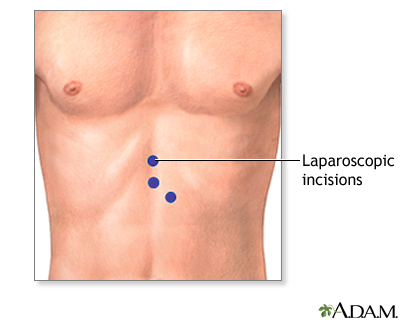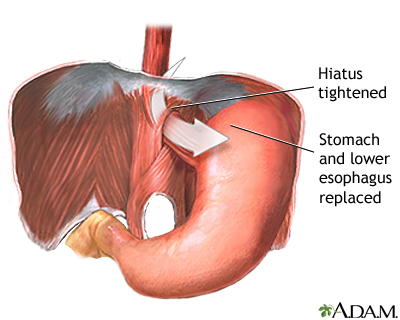Hiatal hernia
Hernia - hiatal
Hiatal hernia is a condition in which part of the stomach extends through an opening of the diaphragm into the chest. The diaphragm is the sheet of muscle that divides the chest from the abdomen.
Causes
The exact cause of hiatal hernia is not known. The condition may be due to weakness of the supporting tissue. Your risk for the problem goes up with age, obesity, and smoking. Hiatal hernias are very common. The problem occurs often in people over 50 years.
This condition may be linked to reflux (backflow) of gastric acid from the stomach into the esophagus.
Children with this condition are most often born with it (congenital). It often occurs with gastroesophageal reflux in infants.
Symptoms
Symptoms may include:
- Chest pain
- Heartburn, worse when bending over or lying down
- Swallowing difficulty
A hiatal hernia by itself rarely causes symptoms. Pain and discomfort are due to the upward flow of stomach acid, air, or bile.
Exams and Tests
Tests that may be used include:
- Barium swallow x-ray
- Esophagogastroduodenoscopy (EGD)
Treatment
The goals of treatment are to relieve symptoms and prevent complications. Treatments may include:
- Medicines to control stomach acid
- Surgery to repair the hiatal hernia and prevent reflux
Other measures to reduce symptoms include:
- Avoiding large or heavy meals
- Not lying down or bending over right after a meal
- Reducing weight and not smoking
- Raising the head of the bed 4 to 6 inches (10 to 15 centimeters)
If medicines and lifestyle measures do not help control symptoms, you may need surgery.
Outlook (Prognosis)
Treatment can relieve most symptoms of hiatal hernia.
Possible Complications
Complications may include:
- Pulmonary (lung) aspiration
- Slow bleeding and iron deficiency anemia (due to a large hernia)
- Strangulation (closing off) of the hernia
When to Contact a Medical Professional
Call your health care provider if:
- You have symptoms of a hiatal hernia.
- You have a hiatal hernia and your symptoms get worse or do not improve with treatment.
- You develop new symptoms.
Prevention
Controlling risk factors such as obesity may help prevent hiatal hernia.
References
Falk GW, Katzka DA. Diseases of the esophagus. In: Goldman L, Schafer AI, eds. Goldman-Cecil Medicine. 26th ed. Philadelphia, PA: Elsevier; 2020:chap 129.
Lord KA, Williamson P. Hiatal hernia. In: Ferri FF, ed. Ferri's Clinical Advisor 2022. Philadelphia, PA: Elsevier; 2022: 760.e2-760.e5.
Schlottmann F, Patti MG. Management of paraesophageal hiatal hernia. In: Cameron JL, Cameron AM, eds. Current Surgical Therapy. 13th ed. Philadelphia, PA: Elsevier; 2020:30-34.
Yates RB, Oelschlager BK. Gastroesophageal reflux disease and hiatal hernia. In: Townsend CM Jr, Beauchamp RD, Evers BM, Mattox KL, eds. Sabiston Textbook of Surgery. 21st ed. Philadelphia, PA: Elsevier; 2022:chap 43.
Anti-reflux surgery
Animation
Hiatal hernia - X-ray - illustration
Hiatal hernia - X-ray
illustration
Hiatal hernia - illustration
Hiatal hernia
illustration
Hiatal hernia repair - series
Presentation
Review Date: 4/21/2021
Reviewed By: Michael M. Phillips, MD, Emeritus Professor of Medicine, The George Washington University School of Medicine, Washington, DC. Also reviewed by David Zieve, MD, MHA, Medical Director, Brenda Conaway, Editorial Director, and the A.D.A.M. Editorial team.









